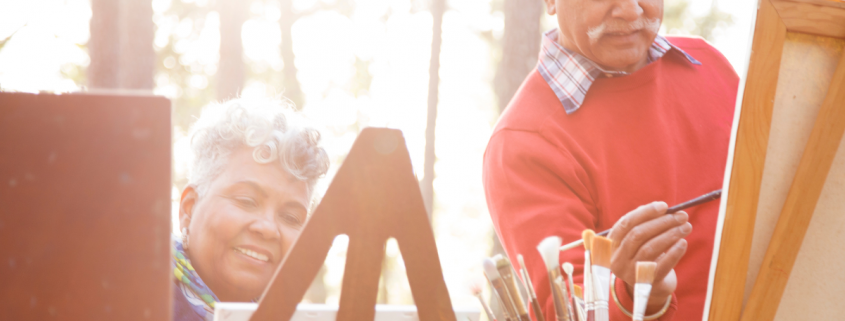Top Sensory Activities for Dementia Patients
Dementia is a serious diagnosis, but not a sentence. Admittedly, this serious disease cannot be cured as of yet, however, its progression can be significantly slowed down with sensory stimulation, especially carried out by a specialist in live-in dementia care.
What are the best activities for the elderly with dementia? What to do with people suffering from Alzheimer’s disease? Today we recommend the best sensory activities for dementia patients so you can introduce them to your loved ones with dementia or Alzheimer’s to improve their brain function and memory.
A brief overview of dementia
Dementia is the general term for memory loss and deterioration of other cognitive abilities severe enough to interfere with the patient’s daily functioning. Alzheimer’s disease is a progressive brain disease characterised by changes in the brain whereby the patient loses neurons and their connections, which accounts for 60-80% of dementia cases. The symptoms of dementia gradually worsen over several years, so with early diagnosis, it is easy to limit the disastrous effects of the disease.
In the early stages, memory loss is mild and rare, but with late-stage Alzheimer’s, people lose the ability to think, recall, carry on a conversation and live independently. That’s the main reason why it’s always worth exercising our brain and incorporating sensory stimulation into life when the first symptoms occur.
Top sensory activities for dementia patients
Below you can find our suggestions and ideas for sensory activities for dementia patients, which you can do with a senior close to you or suggest to a live-in dementia care specialist.
Memory box
A memory box is a venue where you can collect all kinds of memorabilia and important trinkets for your senior. A fun activity like this can help your seniors feel connected to their past careers, hobbies, and family life.
How to get started: Take any type of box and fill it with things he or she used at work, copies of photos and memorabilia, or items related to hobbies. For example, for a former office worker, create a box that reminds him of his career. Place paper clips, pencils, erasers, paper, letters, a calculator, file folders, notebooks, photos of colleagues, or a printed project. Someone who enjoyed cooking or baking might enjoy measuring spoons, a whisk, a spatula and other related items. There are plenty of ideas, just be creative in finding items and encourage your senior to browse through these items.
Jigsaw puzzles
Jigsaw puzzles are great for manual and cognitive skills, as well as promoting memory improvement, so it is one of the best sensory activities for dementia patients. You can offer your senior to put together ready-made jigsaw puzzles, featuring graphics that remind the patient of life events or beloved pets, or you can create your personalised jigsaw puzzle just for them. Simply print out a family photo, a photograph of their home town or their favourite hobby or activity on sturdy cardboard and cut it into small pieces with scissors.
Sensory accessories
There are quite a lot of gadgets on sale to help you come up with sensory activities for dementia patients. You can buy all sorts of sentimental mats and toys that provide sensory stimulation and support improved brain function.
Alternatively, you can create such gadgets yourself. There are hundreds of tutorials on the Internet on how to make a sensory aquarium out of foil – just search YouTube. However, if you don’t have the time, sometimes simple solutions are just as effective. Offer your senior to snap bubble wrap, buy them a pop-it toy, ask them to untie knots, thread noodles, or play with slimes.
Art activities
Nothing calms and develops our cognitive and motor skills more than art activities of all kinds. These are some of the most effective sensory activities for dementia patients, so offer your senior loved one painting, painting by numbers, drawing, colouring, or playing with clay or plasticine.
This type of activity should not be focused on a great visual effect, but rather akin to something like meditation, where the most important thing is the satisfaction of participating in the process. Such activities appeal to the majority of seniors with dementia, especially if they are done together with relatives and grandchildren.
Sensory activities for dementia patients – conclusion
Sensory activities for dementia patients are a wonderful way to spend time together and bring generations together, which additionally has a great impact on inhibiting the progression of the disease. That is why it is a good idea to visit a loved one on your own or with your family from time to time and combine prevention with connecting family members. We guarantee that painting or doing jigsaw puzzles together will be enjoyable and reassuring for both parties.















